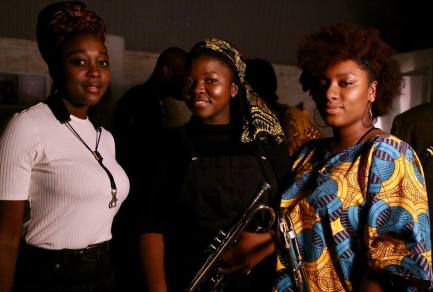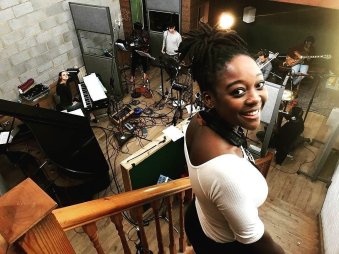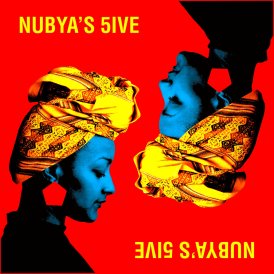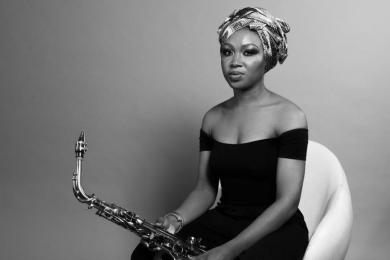2017 saw the beginning of a new generation of young women establish themselves as the new voices and faces of the male dominated UK Jazz scene.

From left to right: Cassie Kinoshi, Sheila Maurice-Grey, Richie Seivwright (source)
The collective Nérija released their self titled EP in late 2016 and were awarded the Jazz Newcomer Parliamentary Jazz Award 2017 in addition to their Jazz FM Breakthrough Act of the Year 2016 nomination. The eclectic nature of the EP reflects not only the different ethnicities and broad influences that the individuals bring, but showcases writing, arranging and improvisational skills reflective of young musicians who are not just improvisers, but keen students and lovers of the music they play. Though many in the band have studied and performed with some of the best jazz musicians in the country, there seems to be a strong sense of purpose to use those lessons and experiences to push boundaries and create an authentic reflection of the cultures these musicians come from.
‘Making sure that people can view jazz as an accessible, down to earth music that is meant to be relatable is really important to me…’ – Cassie Kinoshi

Cassie Kinoshi at SEED ensembles EP recording (source)
This thirst for knowledge, exploration and educating their audiences is exemplified in the work of Cassie Kinoshi, the alto saxophonist for Nérija and leader of the 10 piece band SEED Ensemble. Her politically charged music is encased in harmonically complex passages and lively rhythms, with each composition specifically written in response to situations she has either personally encountered or wider issues such as the lack of recognition for the contributions of Caribbean, African and Asian soldiers during both world wars in the UK. She appeared on my podcast earlier this year and spoke about her wide range of influences including Langston Hughes and Jackie McClean, as well as her views on many issues surrounding the state of jazz today. Cassie was joined by other band members including tenor saxophone and flautist Chelsea Carmichael (who could be seen performing at the BBC Proms this year) as well as trumpeter Sheila Maurice-Grey to recorded SEED’s eagerly anticipated debut EP earlier this year. Don’t be surprised come summer to see them performing at festivals not only across the UK, but hopefully around the world too.
I’ve had the pleasure of performing with Sheila Maurice-Grey for almost two years and I am constantly blown away not only her musicianship, but by her work ethic. Booking, organising, performing, and writing alongside other projects are just some of the activities that these women do almost daily. It’s not just about the ability to perform that separates these musicians from many others, it’s a statement about work ethic that is familiar to many people of colour; you have to be twice as good to get half as much. Sheila performed with rappers Little Simz and Kano this year, as well as with Nérija and leading the band KOKOROKO to cement her place as a musician to keep an eye on in 2018.
KOKOROKO’s front line consists of Cassie Kinoshi and trombonist Richie Seivwright who play music ‘inspired by Fela Kuti, Ebo Taylor, Tony Allen and the great sounds that come out of West Africa’. This cultural influence is not only heard but seen in how many of these musicians present themselves on stage, removing themselves from the traditional aesthetics of suit wearing musicians and cocktail sipping audiences by wearing West African prints, singing, dancing and inviting their audiences to do the same. As Cassie told me, this is not the result of detailed marketing strategies and planning but rather one of comfort and personal taste; headwraps and jazz are no longer mutually exclusive.

Nubya Garcia’s 5ive album artwork (source)
Saxophonist Nubya Garcia appears in a headwrap on the artwork of her EP entitled 5ive which also features Sheila Maurice-Grey on the track Lost Kingdoms, a tune which has over 200,000 plays on Spotify alone to date. Since the release in May 2017, she has gone on to perform in Brazil, appear on BBC Radio 6 with Gilles Peterson, headline at Ronnie Scotts as well as playing in the band, you guessed it – Nérija. She has appeared in numerous articles detailing her work and career path, all seemingly vying to speak to one of the faces of the new London jazz scene before she becomes an international star. Her EP reflects her eclectic influences, with her laid-back style of improvisation and rhythmical interaction with her band engaging the listener without the use of clichéd licks and phrases. Like the music of her contemporaries, you can hear an underpinning of a solid jazz theory education, but diffused into the many different styles personal to members of Nérija, SEED and KOKOROKO. Nubya received a British Jazz Rising Star nomination in 2017, a category which also included fellow saxophonist Camilla George. Camilla’s debut album Isang earned her glowing reviews in the Evening Standard and The Guardian, paving the way for her to support legendary singer Dee Dee Bridgewater at the EFG Jazz festival in November 2017 amongst numerous other gigs up and down the country. Next year promises to be another fruitful one Camilla who Jane Cornwell referred to as ‘the girl with the golden touch’.

Camilla George (source)
#jazzmum was a hashtag used by Nubya herself to describe pianist Nikki Yeoh who won Jazz FM Instrumentalist of the year in 2017. Although she is not new to the scene having performed with the likes of Chick Corea and Courtney Pine, I’m excited to hear great things from her in 2018, having seen her live with Denys Baptiste earlier this year. Honourable mentions go to Yazz Ahmed who released her album La Saboteuse this year to critical acclaim, guitarist Shirley Tettah who is one of the driving forces in Nérija and pianist Sarah Tandy who features in the Guardians top 40 newcomers of 2018.
One of the most striking aspects about all of these musicians’ success is the sense of community. Most of these musicians mentioned have played together either with Tomorrows Warriors or Jazz Jamaica, and still supporting each others’ projects, contributing to the London sound which is gaining international attention. It’s encouraging to see these women utilise the resources available to them and producing music which is able to speak to so many people on a multitude of different emotional and intellectual levels.
It’s not hard to see that Jazz in 2017 belonged to these remarkable women. In addition to creating great music, they carry a sense of humility that seems to acknowledge what they are doing, but realise that the possibilities are endless, and that 2018 looks set to see a continuation of the new London jazz sound as led by these talented and hard working women.
